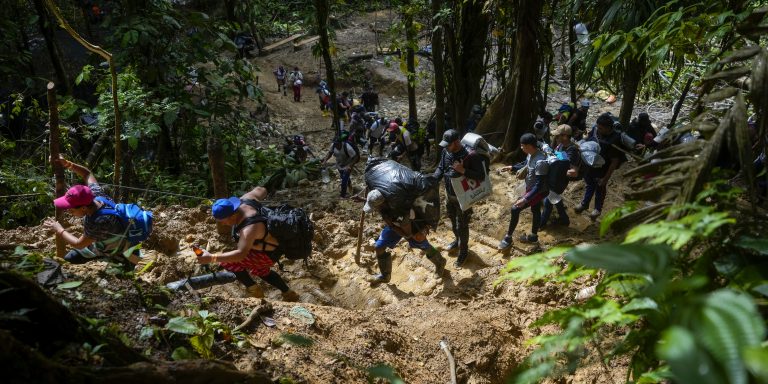INTELBRIEF
September 6, 2023
IntelBrief: The Global Increase in Cross-Border Migration and the Challenges Ahead

Bottom Line Up Front
- A perfect storm of events has led to increased border skirmishes and instances of spillover violence as the cross-border movement of people continues to further destabilize domestic politics in countries across the world.
- From Venezuela to Myanmar, the movement of large groups of people has put some of society’s most vulnerable populations at risk.
- Throughout North Africa, which has become emblematic of the horrors of human smuggling and trafficking, large numbers of migrants have been brutalized.
- The issue is one of both human security and human rights, with most trends suggesting that the challenge is going to become more complicated, with climate change, food insecurity, and resource competition figuring prominently into conflicts between and within states.
A perfect storm of events, issues, and complex factors has led to increased border skirmishes and instances of spillover violence as the cross-border movement of people continues to further destabilize domestic politics in countries across the world. No part of the globe is immune, and it has become nearly impossible to neatly disaggregate the myriad factors that are driving migrants to make perilous journeys in search of a new home. Whether escaping disease, poverty, or war, the movement of people across borders presents a significant challenge to governments, many of which are ill-equipped to deal with the magnitude of these human flows. Moreover, as is typically the case when examining the sordid underbelly of globalization, the winners are almost always transnational criminal networks, operating in the shadows, enabled by emerging technologies, and propelled by a ruthlessness that often remains difficult to comprehend. Tighter border restrictions and diminished regular pathways have increased the demand – and profits – for smugglers and human traffickers, generating millions of euros a year for organized criminal networks, according to the European Coast Guard and Border Agency.
From Venezuela to Myanmar, the movement of large groups of people has put some of society’s most vulnerable populations at risk. In Myanmar, tens of thousands of refugees have fled to India over the past several years, many of whom arrive to a rather unwelcome reception. Hundreds of thousands have been internally displaced, including in the southeast, along the border with Thailand. Millions are in dire need of humanitarian assistance, and non-governmental organizations have reported hundreds of attacks and threats against health workers, facilities, and transports, the vast majority of which were attributed to the military and police. Also, over the past several years, millions of Venezuelans have fled the country, representing a mass exodus on the scale of the Syrian civil war. Yet, the drivers of migration in Venezuela are hunger, poverty, political corruption, and widespread crime. That Venezuela’s suffering is a result of corruption and economic incompetence, not international conflict or insurgency, means that the country and the unfolding crisis draw less media attention than Syria, Iraq, or Afghanistan. This does not mean the Venezuelan refugee crisis is any less concerning or deserving of international attention and support.
Throughout North Africa, which has become emblematic of the horrors of human smuggling and trafficking, large numbers of migrants have been brutalized. Libya has become anarchic with multiple militias and the targeting of civilians, including sexual and gender-based violence. Migrants are at particularly high risk of being held in detention centers, where they are exploited for commercial sex and forced labor. Despite fits and starts of progress, the country still suffers from rival claims of authority. In Tunisia, tensions have mounted between authorities and migrants, culminating in chaos and violent clashes. Police have been accused of attacking migrants with tear gas and batons. Accordingly, Tunisia has become a key departure point for those fleeing poverty and violence in sub-Saharan Africa and the Middle East. The increase in migrant arrivals via the Mediterranean route has recentered and amplified a fixture of European politics, providing considerable leverage for renewed autocracies like Tunisia and bolstering far-right narratives and policies.
In sub-Saharan Africa’s volatile Sahel region, water resources are projected to diminish in the years ahead, while “violence is expected to continuously erupt across the region unless …. resilience to climate change is strengthened,” according to an August 2022 report by the UN High Commissioner for Refugees and the UN Office of the Special Coordinator for Development in the Sahel. Given the political instability throughout the Sahel, including several high-profile coups, the governments in this region are both unwilling and unable to deal with issues related to migration, focused almost exclusively on coup-proofing their regimes, prioritizing security at all costs and eschewing longer-term planning and good governance initiatives in favor of survival.
Disputes over access to water, whether in an urban setting in the Middle East, or between agrarian communities and fishermen throughout the Sahel region in Africa, are now a regular phenomenon. According to the Washington Post, cities including Basra (Iraq), Lagos (Nigeria), and Delhi (India) are now experiencing more days of highly dangerous heat each year, a trend likely to continue. In Pakistan, new diseases have emerged, labeled “climate-fueled illnesses,” that are linked to hotter temperatures which, in turn, allow pathogens and toxins to be transmitted more rapidly. While the issue of migration has been especially devastating throughout the Global South, many parts of the Global North have also been impacted, including the United States. The issue is one of both human security and human rights, with most trends suggesting that the challenge is going to become more complicated, with climate change, food insecurity, and resource competition figuring prominently into conflicts between and within states.